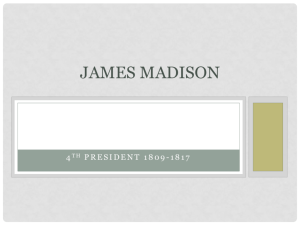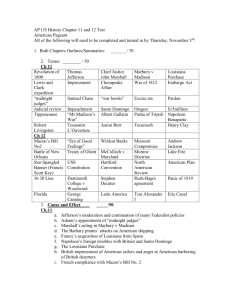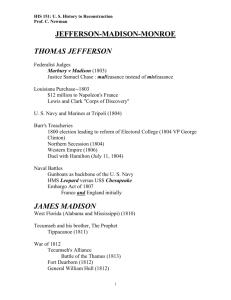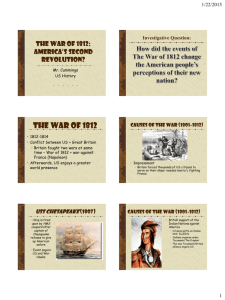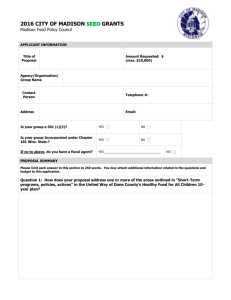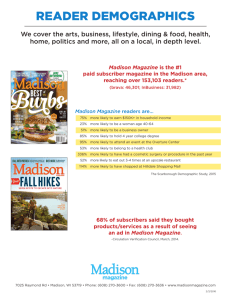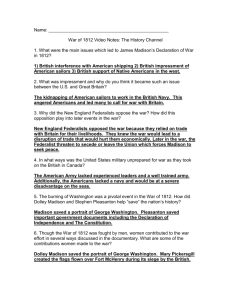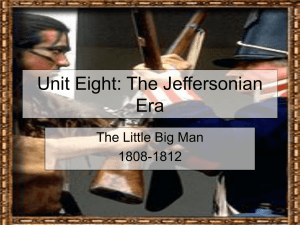James Madison
advertisement
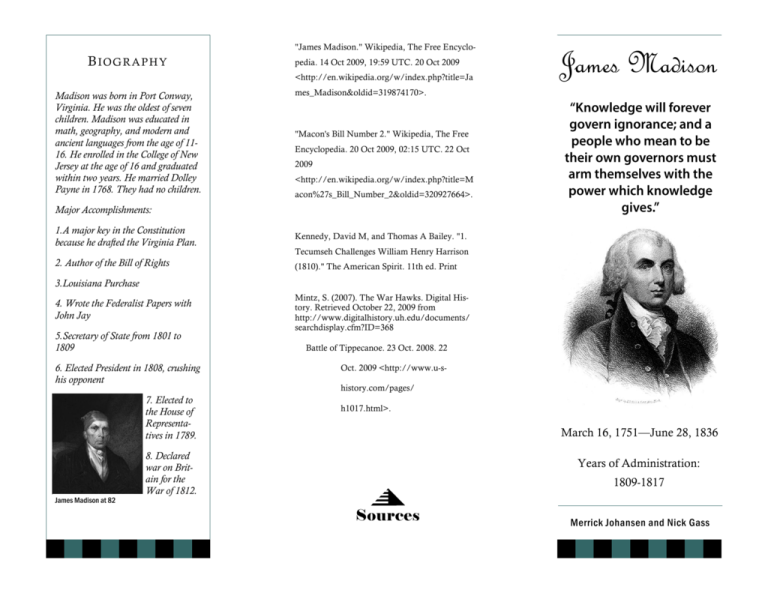
"James Madison." Wikipedia, The Free Encyclo- BIOGRAPHY pedia. 14 Oct 2009, 19:59 UTC. 20 Oct 2009 <http://en.wikipedia.org/w/index.php?title=Ja Madison was born in Port Conway, Virginia. He was the oldest of seven children. Madison was educated in math, geography, and modern and ancient languages from the age of 1116. He enrolled in the College of New Jersey at the age of 16 and graduated within two years. He married Dolley Payne in 1768. They had no children. James Madison mes_Madison&oldid=319874170>. "Macon's Bill Number 2." Wikipedia, The Free Encyclopedia. 20 Oct 2009, 02:15 UTC. 22 Oct 2009 <http://en.wikipedia.org/w/index.php?title=M acon%27s_Bill_Number_2&oldid=320927664>. Major Accomplishments: 1.A major key in the Constitution because he drafted the Virginia Plan. Kennedy, David M, and Thomas A Bailey. "1. 2. Author of the Bill of Rights (1810)." The American Spirit. 11th ed. Print Tecumseh Challenges William Henry Harrison 3.Louisiana Purchase 4. Wrote the Federalist Papers with John Jay 5.Secretary of State from 1801 to 1809 6. Elected President in 1808, crushing his opponent 7. Elected to the House of Representatives in 1789. James Madison at 82 Mintz, S. (2007). The War Hawks. Digital History. Retrieved October 22, 2009 from http://www.digitalhistory.uh.edu/documents/ searchdisplay.cfm?ID=368 Battle of Tippecanoe. 23 Oct. 2008. 22 Oct. 2009 <http://www.u-shistory.com/pages/ h1017.html>. March 16, 1751—June 28, 1836 8. Declared war on Britain for the War of 1812. Years of Administration: 1809-1817 Sources Merrick Johansen and Nick Gass Climate During Madison’s Presidency The Bank of America Charter M AC O N ’ S B I L L N O . 2 Macon’s Bill No. 2 was made to persuade the British and French to stop seizing American trade vessels during the Napoleon Wars. This bill is a revi- “The Decrees of France, the Edicts of sion of the one proposed by Nathaniel Macon. Napo- England, and the Acts of Congress, leon promised neutrality for the American vessels but though intended to counteract each other, did not follow through with his promise. Madison expired in 1811. Once the War of was never a strong supporter of this bill because it 1812 broke out, he realized it was very created weaknesses for America. European countries difficult to fund a war without a na- were able to play off of these weaknesses which an- tional bank. By 1815, Madison pro- gered America posed a new bank with the support of the nationalist republicans. American relations with the British were weak under Madison, evident of the War of 1812. The War of 1812 was the biggest event of Madison’s presidency. The British army recruited American Indians including the Tecumseh who fought the battle of Tippecanoe. Because both the Americans and British were exhausted from the war, they signed the Treaty of Ghente, ending the war in 1815. This treaty then was followed by the Era of Good Feeling where Madison passed a bill for “internal improvements” and admitted Louisiana and Indiana as states. P R I M A RY S O U RC E S B AT T L E OF constitute in effect, a triple league for the annihilation of American commerce; and our own government” (J.C. Jones 1812) This source explains how the bill that America created along with the bills that European countries created will lead to TIPPECANOE CREEK The Battle of Tippecanoe was fought on November 11, 1811, and was between the United States and the American Indian Confederation. The United States was led by Governor William Henry Harrison, and the American Indian Confederation was led by Tecumseh and his brother Tenskwatawa. The United States was fighting for the land they bought off of other natives that lived in these territories and the American Indian Confederation was fighting because they never agree to this purchase that was made by the United States. The battle was eventually fought and won by the United States, but is often looked at as a draw. There were many outcomes of this though which include the safety of the Indiana territory, the discredit of Tenskwatawa, the role of Indians in the War of 1812, and much more. the destruction of the American economy. It also shows how these European countries were harassing and taking advantage of the new government. “The white people have no right to take the land from the Indians, because they had it first. It is theirs. They may sell but all must join.” (Tecumseh 1810) This source shows the side of the Indians which is usually looked over when looking at history. We always read primary sources from American writers, but in this case it shows Tecumseh’s opinion on the issue over the Battle of Tippecanoe.
